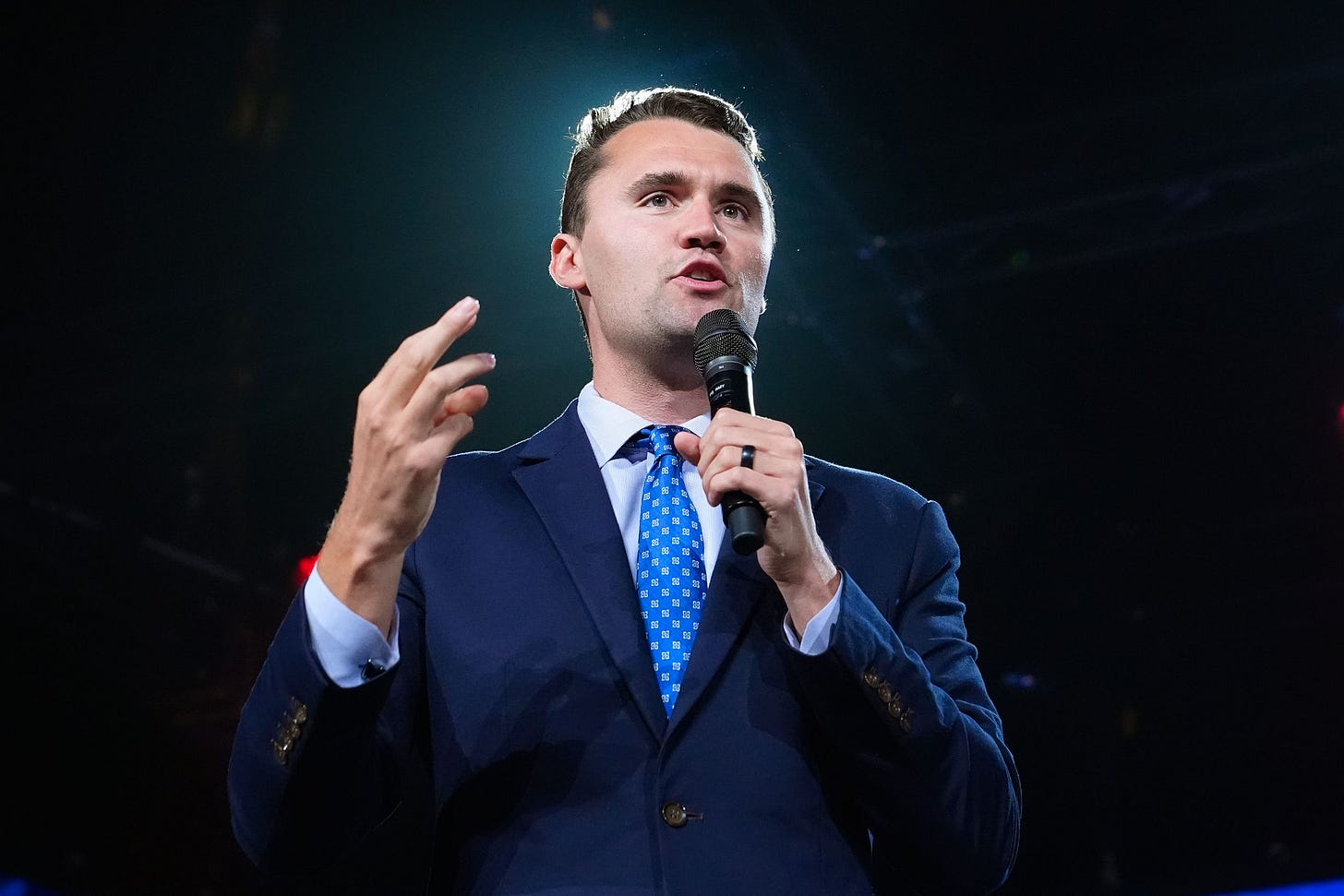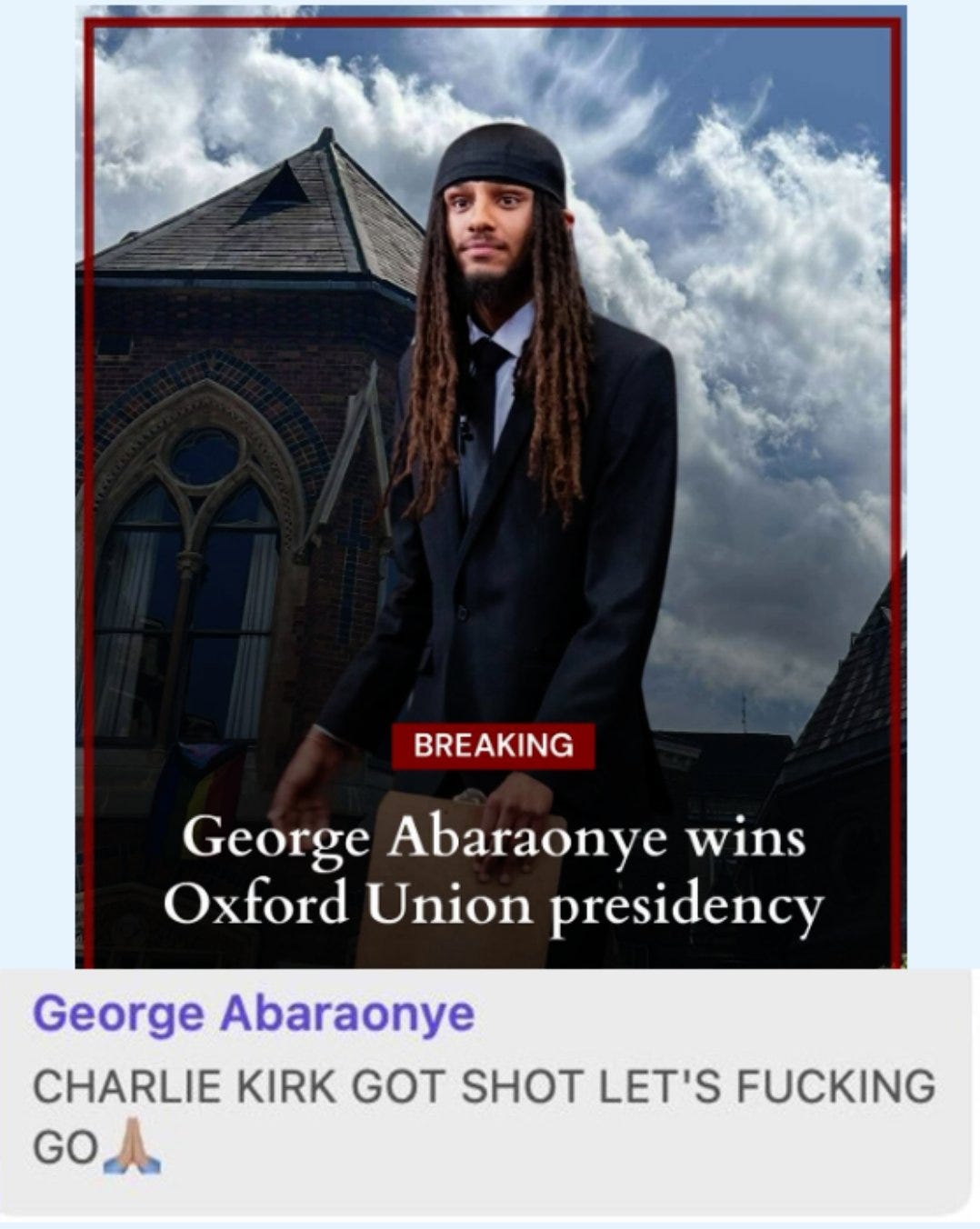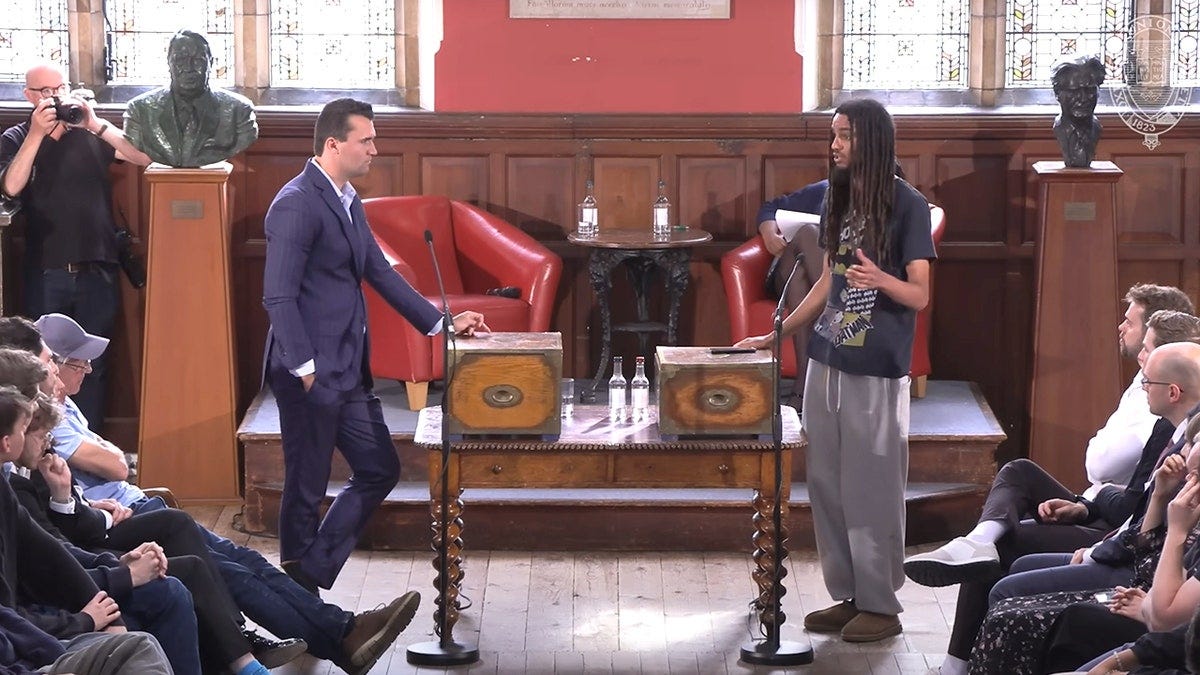Why the West must double down on civil discourse
Civil war or civil discourse? The stakes for Western democracy couldn't be higher.
Charlie Kirk’s assassination affected me more than I care to admit. In the days after, I felt a heavy dread. I told myself to logoff… and failed.
I served on the advisory board of Charlie’s organization, TPUSA, before breaking from the Trump movement. We weren’t close, but watching the assassination of someone I knew on repeat across the Internet — a strike to the neck, a burst of blood — was horrifying. Part of me wanted to believe it wasn’t real.
Charlie was a genuine, Midwestern sort of guy. He wasn’t an intellectual, but he was a gifted communicator and organizational leader. Above all, he stood for civil debate. He modeled it. And in a cruel twist of fate, he died while engaging in it. His brutal, public assassination shows what’s at stake for Western democracy: do we resolve our differences through civil discourse or let them spiral into civil war?
Charlie’s brutal, public assassination shows what’s at stake for Western democracy: do we resolve our differences through civil discourse or let them spiral into civil war?
Conservatives are understandably angry.1 Many see Charlie’s assassination not as the act of one man but as the logical extension of leftwing rhetoric and ideological dominance across media, education, and NGOs. “They want us dead,” many say.2 And in response, some are calling for Trump to go full Pinochet on the left.
While I sympathize with their frustration, I can’t think of a worse way to honor Charlie’s memory than by further embracing fascism, authoritarianism, or whatever label you want to use. That would only deepen the problems facing America and other democracies. It’s un-American and a cope that would point us to one of two dead ends: autocracy or civil war. Either way, the cure would be worse than the disease.
I can’t think of a worse way to honor Charlie’s memory than by embracing fascism, authoritarianism, or whatever label you want to use.
The better way to honor Charlie is by doubling down on what he stood for: civil discourse. And we should defend it vigorously not just in America but across Western democracies.
No one deserves a bullet for speaking, jail for posting a good-faith opinion, or a punch to the head because someone branded them a nazi or commie. Political violence is poison to democracy, no matter where it comes from. The heckler’s veto is poison too. Yet too many people in our societies shrug or even cheer when it’s on their side. That corrodes democracy at its core. It’s toxic and self-defeating.
No one deserves a bullet for speaking, jail for posting a good-faith opinion, or a punch to the head because someone branded them a nazi or commie.
At the risk of sounding like an old free-speech hippie, the entire point of democracy is to resolve differences with words instead of guns. Civil discourse is the closest thing we have to a truth machine, and it should be guarded with the full force of government. Democracy’s most precious, non-negotiable value is that discourse be free of the threat of violence.
Yet many in Western democracies don’t share that value. In the U.K., the head of the Oxford Union, one of the most storied debate societies in the West, openly celebrated Charlie’s shooting. This was someone who had debated Charlie in the past. Legally, he has the right to say what he did. But the spirit behind it is fundamentally undemocratic. When debate society leaders celebrate assassinating people for their political opinions, you know we have a problem.
This gets at the paradox at the heart of Western democracies: how our openness combined with progressive ideological hegemony have undermined the preconditions of functioning liberal democracy.
Too often, progressives and DSA (Democratic Socialists of America) types want it both ways, to own the mantle of “democracy” while shutting down speech they don’t like. And some justify violent direct action. I too have felt the fear of this violence and, no, it wasn’t just in my head. At the “Deploraball” inaugural party I helped organize in 2017, there was an attempted acid attack. A local antifa protester was arrested … and received a slap on the wrist for literal terrorism.3
Political violence cuts both ways, of course. And it should be no less tolerated when it’s from the right, as it often is. I increasingly view far-left and far-right violent extremism as two sides of the same coin. Both are fueled by agitators and foreign actors in dark corners of the internet. The radicalization path is just one Discord server versus another.4
I increasingly view far-left and far-right violent extremism as two sides of the same coin. Both are fueled by agitators and foreign actors in dark corners of the internet. The radicalization path is just one Discord server versus another.
Some rightwing intellectuals argue we’re past the point of return. “If Charlie Kirk can be cast as Baby Hitler, what chance is there for common ground?” they might ask. And I get it. To them, we are already in cold civil war with irreconcilable differences.5 But yelling “war” without offering a way out only makes things worse. It’s hysterical and self-fulfilling. Plus, there is a way out: doubling down on civil discourse, while going “zero tolerance” on political violence. This is how we stay in the democracy lane.
It’s also dishonest to declare we’re already at war. While many individuals justified Charlie’s assassination, no mainstream Democratic politicians did. Most Americans, left and right, still oppose political violence.6 My own experience has reflected this duality. On TikTok, I posted a tribute to Charlie that was flooded with horrible comments justifying his death, mostly from anonymous accounts.7 But on Facebook my left-leaning friends universally responded with sympathy.
So what can we do? What must we do? We must double down on civil discourse as a shared value. We will never eliminate political violence entirely, but we can minimize it. Some actionable ideas include:
Reexamine ways to address inauthentic discourse, especially from foreign actors. This includes deliberate disinformation, coordinated agitation, and swatting.
Enforce the TikTok divestiture deadline. A foreign-owned platform should not be a breeding ground for illiberalism.
Appoint a more experienced official as head of DHS’s task force against domestic extremism, someone who will address violent extremism fairly and professionally from all sides.8
Rework civics curricula to teach civil discourse and the art of how to disagree.
Support organizations that foster real debate, like Open to Debate.
Fund campus security so speakers can appear safely, and hold colleges accountable for protecting free expression.
These are just starting points. The deeper need, especially on the right, is to summon the will to defend our democracies in the first place. It is crazy to cede “democracy” to the left.
We must decide civil discourse is worth fighting for. It’s our best tool to manage conflict, prevent tyranny, and rejuvenate democracy.
Western democracies face a stark choice: civil war or civil discourse. Charlie would choose discourse. We should too.
Special thanks to for reviewing an early draft.
Related Essays
Theme Song
See this YouGov poll from last week. 72% of U.S. adults say violence to achieve political goals is never justified.
I used to ban TikTok, but I started dabbling when we mandated they fork its ownership. Plus, both Harris and Trump had accounts there during the campaign. Yes, I’m a bit of a hypocrite, but I allow myself to change my mind.
Not a 22-year-old.






Your article is definitely a salutary and authentic example in the tradition of the best of American political discourse. I applaud your call for staying true to our unique American experiment in self-government, which is founded on our right to free speech.
Your personal experience on the TPUSA Board and as a near-victim of political violence by Antifa gives your thoughts a special resonance.
I also agree with and endorse your policy proposals, while noting they start strong and gradually become less effectual, hardly efficacious responses to a dire emergency, which is what we are in:
“Appoint a more experienced official as head of DHS’s task force against domestic extremism, someone who will address violent extremism fairly and professionally from all sides.⁷
Rework civics curricula to teach civil discourse and the art of how to disagree.
Support organizations that foster real debate, like Open to Debate.
Fund campus security so speakers can appear safely, and hold colleges accountable for protecting free expression.”
Importantly, even your relatively mild last three proposals, in order to be effective, must be implemented in the context of initiatives that address the widespread institutional capture which is the reality in America today. Otherwise, those proposals will be bitterly resisted and neutralised.
The incumbent status quo in America today is that toxic, potentially and actually violent anti-Americans have infiltrated not only the funding networks and senior leadership of every major American institution, but as last week demonstrated, their rank and file as well. We are talking about the commanding heights of our economy and society and millions of Americans as well, who are literal better than domestic enemies.
What would be your recommendations for dismantling, through a process that honors and upholds the best of American political traditions, the institutional capture by America’s domestic enemies of the universities, the media, large swaths of government bureaucracies (including the newly renamed War Department), the vast NGO networks and institutional philanthropy, the Democrat Party eco-system, the hundreds if not thousands of partisan judges and DAs, the HR departments and C suites of many financial institutions and major corporations, the teachers union, and so on?
The two empirical measurements which will indicate that the crisis is receding will be a steep decline in the value of Washington DC real estate and the successful deportation / repatriation of at least 10 million illegal immigrants.
The policies required to actually accomplish a re-set of this magnitude will require the appearance of a political genius who is uniquely American.
(Lol I already see in previous comments the reflexive institutional pushback about which I’m concerned.)
I always find your writing a good model for the origins of civil discourse, which is how we talk to ourselves. The way you reflect on your own views and perspectives over time, self-interrogating their accuracy or value to you, and giving yourself the freedom to change your mind is instructive to me.